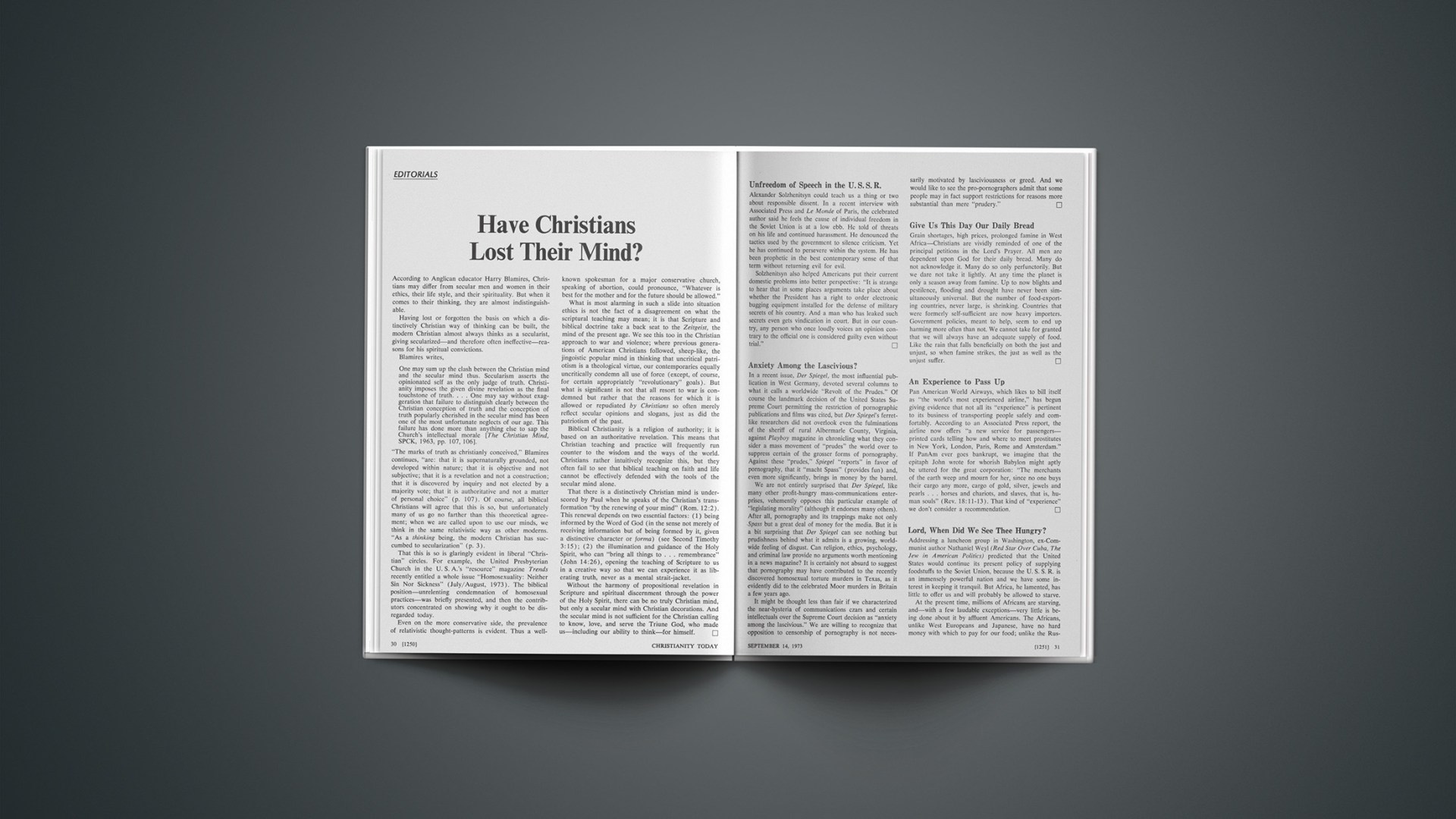According to Anglican educator Harry Blamires, Christians may differ from secular men and women in their ethics, their life style, and their spirituality. But when it comes to their thinking, they are almost indistinguishable.
Having lost or forgotten the basis on which a distinctively Christian way of thinking can be built, the modern Christian almost always thinks as a secularist, giving secularized—and therefore often ineffective—reasons for his spiritual convictions.
Blamires writes,
One may sum up the clash between the Christian mind and the secular mind thus. Secularism asserts the opinionated self as the only judge of truth. Christianity imposes the given divine revelation as the final touchstone of truth.… One may say without exaggeration that failure to distinguish clearly between the Christian conception of truth and the conception of truth popularly cherished in the secular mind has been one of the most unfortunate neglects of our age. This failure has done more than anything else to sap the Church’s intellectual morale [The Christian Mind, SPCK, 1963, pp. 107, 106].
“The marks of truth as christianly conceived,” Blamires continues, “are: that it is supernaturally grounded, not developed within nature; that it is objective and not subjective; that it is a revelation and not a construction; that it is discovered by inquiry and not elected by a majority vote; that it is authoritative and not a matter of personal choice” (p. 107). Of course, all biblical Christians will agree that this is so, but unfortunately many of us go no farther than this theoretical agreement; when we are called upon to use our minds, we think in the same relativistic way as other moderns. “As a thinking being, the modern Christian has succumbed to secularization” (p. 3).
That this is so is glaringly evident in liberal “Christian” circles. For example, the United Presbyterian Church in the U. S. A.’s “resource” magazine Trends recently entitled a whole issue “Homosexuality: Neither Sin Nor Sickness” (July/August, 1973). The biblical position—unrelenting condemnation of homosexual practices—was briefly presented, and then the contributors concentrated on showing why it ought to be disregarded today.
Even on the more conservative side, the prevalence of relativistic thought-patterns is evident. Thus a well-known spokesman for a major conservative church, speaking of abortion, could pronounce, “Whatever is best for the mother and for the future should be allowed.”
What is most alarming in such a slide into situation ethics is not the fact of a disagreement on what the scriptural teaching may mean; it is that Scripture and biblical doctrine take a back seat to the Zeitgeist, the mind of the present age. We see this too in the Christian approach to war and violence; where previous generations of American Christians followed, sheep-like, the jingoistic popular mind in thinking that uncritical patriotism is a theological virtue, our contemporaries equally uncritically condemn all use of force (except, of course, for certain appropriately “revolutionary” goals). But what is significant is not that all resort to war is condemned but rather that the reasons for which it is allowed or repudiated by Christians so often merely reflect secular opinions and slogans, just as did the patriotism of the past.
Biblical Christianity is a religion of authority; it is based on an authoritative revelation. This means that Christian teaching and practice will frequently run counter to the wisdom and the ways of the world. Christians rather intuitively recognize this, but they often fail to see that biblical teaching on faith and life cannot be effectively defended with the tools of the secular mind alone.
That there is a distinctively Christian mind is underscored by Paul when he speaks of the Christian’s transformation “by the renewing of your mind” (Rom. 12:2). This renewal depends on two essential factors: (1) being informed by the Word of God (in the sense not merely of receiving information but of being formed by it, given a distinctive character or forma) (see Second Timothy 3:15); (2) the illumination and guidance of the Holy Spirit, who can “bring all things to … remembrance” (John 14:26), opening the teaching of Scripture to us in a creative way so that we can experience it as liberating truth, never as a mental strait-jacket.
Without the harmony of propositional revelation in Scripture and spiritual discernment through the power of the Holy Spirit, there can be no truly Christian mind, but only a secular mind with Christian decorations. And the secular mind is not sufficient for the Christian calling to know, love, and serve the Triune God, who made us—including our ability to think—for himself.










